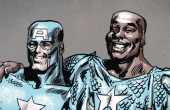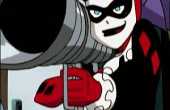SomeOtherAmazon
Contributing writer for The Artifice.
Contributor I
- Plebian Penman
- Lurker
- Pssst
- Sharp-Eyed Citizen
- Town Watch
- Fanboy
- ?
- Articles
3 - Featured
2 - Comments
25
- Ext. Comments
21 - Processed
14 - Revisions
10
- Topics
6 - Topics Taken
1 - Notes
13
- Topics Proc.
6 - Topics Rev.
0
- Points
637 - Rank
184 - Score
364
Latest Articles
Latest Topics
Hidden Holiday Legends: Should we start seeing some of the darker holiday legends?Much of the holiday season is saturated with a canon of Christmas movies. However, the recent release of "Krampus" has reminded movie goers that there are some darker holiday legends. Analyze these lesser known stories and whether or not you think they should be considered for holiday prime time.
|
How Do We Get People to Read Comics?Over the summer a friend expressed an interest in starting to read comics to me, however he seemed overwhelmed and eventually disheartened by the idea. Too many titles, too much history, and too expensive… it can be a little much for people on the outside. It's become a somewhat accepted fact that actual reading of comic books is a subculture. Look into how this small readership (vs cinematic and televisions viewers) effects the industry. What can be done to make people more interested in picking up the titles? How do we help people with the interest start?
|
Teenage Girl Heroes: How are the Big Two Writing Young WomenWith Ms. Marvel and Batgirl of Burnside as just two examples, how are Marvel and D.C. writing young women as heroes? What sort of plot devices do they use to make them relatable? In what areas do they succeed or fail? Furthermore, analyze whether or not these characters have been successful in reaching a wider demographic for the comic industry. |
Creating New Heroes: How Do We Decide What's Good EnoughComic fans love their heroes, and their tested and true stories that have been rewritten and reimagined for well over half a century. Recently, however, there's been talk of creating new heroes, new teams, and new identities that better represent our modern ideologies and culture. What really makes a new hero worth publishing? What sort of criteria should be followed to give a character the longevity of the greats? What aspects of our society can we fuse into new heroes to further the ongoing mythology of the superhuman? Analyze whether it is about diversity, history, relatability, or something else entirely.
|
2 vs. 1, Captain America and Racial Identity: Does the fact that there have been 2 black Captain Americas and only one white one matter?I'm taking a course on race in pop culture and was recently assigned to read Truth: Red, White, and Black. This alternate mythos of the Captain America story suggests that before Steve Rogers and Sam Wilson there was another Captain America- a black man named Isaiah Bradley. Bradley (and many other African American men) are unwillingly forced into government experimentation to perfect the super serum that will later make Rogers a hero. However, many of these early test subjects died on the table, or suffered from complications later on. Isaiah is the only survivor, and dawns the Captain America costume on a suicide mission behind enemy lines. Though he survives, Isaiah is ultimately mistreated by the American government until Steve Rogers finds out about him and demands a form of justice. Including this title, there have now been two black men do wear the Captain America persona. Should this be getting more attention? Does the popularity of Steve Rogers (as much as I love him) above Sam Wilson and Isaiah Bradley say something about the way we accept our superheroes; especially one as symbolically loaded as Captain America?
|
Published | How effective is changing the race of a preexisting character as helping to create diversity in the comic world?There’s a steady mix of both praise and outrage at the idea of a black Captain America; but the real issue is not a question of Steve Rogers or Sam Wilson. It’s a question of what diversity means to different fans and what solutions can be reached to ensure the inclusion of everyone invested in comic book culture. Does changing the race of a well known character help this process? Would it be more effective to just create new characters?
|
Latest Comments
| Overweight Superheroes and Supervillains | |
This is a really fantastic title. I’ve read up to issue 15 so far and I love it. Thanks for explaining the mist, I wasn’t clear on that. Great article! | Kamala Khan: The new Ms. Marvel |
Defining something through race is completely different than being defined by race | How Isaiah Bradley and Steve Rogers Define Captain America Through Race |
This is a really great analysis. I’ve always thought that the family dynamic is why I prefer Bob’s Burgers to other animated families. The characters are actually likable, which I cannot say about the Griffins. | Familial Love: The Special Ingredient in Bob's Burgers |
this might be more relevant https://the-artifice.com/women-in-refrigerators-killing-females-in-comics/ | Moral Truths Within 'The Killing Joke': Tragedy and Choice |
I’m not sure how this comment is relevant as this article in no way discusses female characters/ gender issues. That being said, there is a lot of work on Barbara Gordon who has recently been revitalized and remedied in her most recent title. So I suggest you read that. | Moral Truths Within 'The Killing Joke': Tragedy and Choice |
These movies often get left out when I think of movies I loved as a child. but seeing them here I remember how much I enjoyed them all, especially Anastasia! | Five Animated Musicals That Are Not Disney |
I don’t really see what any of this has to do with the point of the article. It’s about sexuality (gay or straight and so on) not sexualization | Sexuality in American Superhero Comics |



This is a really interesting point. Since graduating college I’ve been helping a good friend develop his comic book series, and he made the point that the lack of diversity in superhero bodies gets to be really boring. It’s boring to draw, animate, and write- and it seems to take away layers of creative potential. What drew me to this article was the picture of Faith, as it’s a title I’ve just started reading. It may be safe to speculate that with the amount of physical activity superheroes partake in, they probably won’t be overwhelmingly overweight. However, I know plenty of people who have healthy lifestyles and are just naturally bigger. I don’t think it’s fair to only show super skinny or super muscular body types as either male or female comic book characters. As pointed out in the article, there have been a few overweight comic book characters, but what about just different body types? Beer bellies and curves are pretty common in reality, I think it could add to stories to start throwing in some new body types.